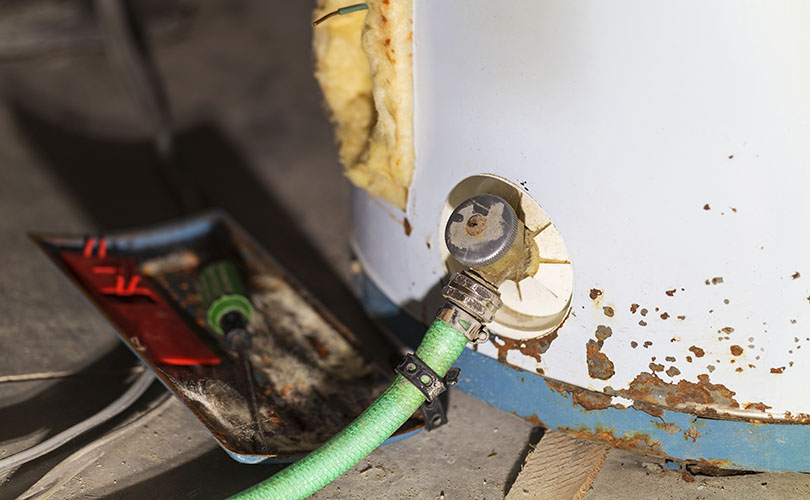If you have a water heater that has rusted at the bottom, you may wonder if you should get a new one. Rust is generally a bad thing since it eats away metal. It can ruin the inside and outside of your water heater and even cause problems. Rust can occur on both gas and electric water heaters.
How Do You Know When A Hot Water Heater Needs To Be Replaced?
If your water heater is beginning to show signs of rust, it might be time to replace it. Some signs that your heater is near its end include visible rust spots on the tank or heating element, water temperatures that are no longer hot enough, and age.
You can drain a bucket of water to check for rust on your water heater. If you see rust on the water tank, you should immediately call a plumber to fix it. If the rust is causing water leaks, the problem may be with the tank itself. In addition, rusting water heaters can cause sediment buildup that can affect the heating system, which increases strain and speed up the formation of cracks.
Discolored water is another sign that your water heater needs to be replaced. This is because sediment prevents water from properly transferring heat from the heating element. The sediment will cause water to become more discolored and cloudy, which can negatively affect water quality. Discolored water can also lead to a higher heating bill.
Can You Repair A Rusted Hot Water Heater?
A rusted water heater has several possible causes. The water in the tank can be too hot, which leads to corrosion. Another cause is a cracked heat exchanger. These can be repaired or replaced by a technician. When the water heater’s heat exchanger is cracked, it can allow carbon monoxide and other toxic gases to escape.
Rusted water heaters usually have an anode rod that needs to be replaced. This rod is made of aluminum or magnesium and sits inside the tank. If it corrodes, the water from the heater will corrode the anode and start to rust. Fortunately, this is a relatively simple fix. You will need to remove the rusted anode rod and replace it with a new one designed for your water heater.
If the rust is on the outside of the water heater, you can clean it with a wire brush and sandpaper. However, if it’s inside, you may need a professional to remove the rust. If the rust is causing a leak in the system, a water heater technician can take care of this and prevent it from spreading and causing damage to your home.
What Is Causing The Bottom Of My Water Heater To Rust?
If you notice rusting at the bottom of your water heater, there are a few possible causes. The first is poor combustion. Rusting occurs much more slowly in a dry climate than in a wet climate. Another cause could be back drafting. If you can pinpoint the source of the rust, you can take immediate action to correct it.
If the rust is only visible outside your water heater, you can use sandpaper or wire brushes to scrape off the rust. However, if the rust is too extensive, you may have leaks, damaging your home. If the rust spreads inside your water heater, it may be time to call a plumber.
Another common cause of rusting water heaters is a broken or missing anode rod. A plumbing professional can replace the anode rod if necessary.
What Causes Rust On Top Of Water Heater?
If you notice rust on the top of your water heater, there are a couple of possible causes. The most common is metal corrosion. This is caused by the anode rod failing to protect the water heater’s tank. When the anode rod fails, the metal on the tank becomes exposed.
Another possible cause is a leak in a connection. When this happens, water will drip onto the tank and cause rust. A water heater technician can help you find and repair the leak and control the rusting process. If the rusting is extensive, you should consider replacing the water heater.
If the rust is on the exterior of the water heater, you can attempt to remove it yourself with a wire brush or sandpaper. But if the rust is too extensive, it could cause a leak or even damage your home. If you’re unsure how to fix the problem, call a plumber. Rust is also a sign of corrosion caused by moisture inside the house.
The first step to fixing the rust on a water heater is to drain the hot water. To do this, open the hot water valves and drain the tank. Next, locate the cold water inlet pipe that runs above the corroded area. Remove the corroded fitting and replace it with a new copper one. Once complete, seal the pipe with the solder and attach it to the new fitting. Finally, test the pipe to make sure it’s functioning properly.
What Are the Signs of a Failing Water Heater?
If you notice your water is cold when you turn on the faucet, your water heater might fail. It can be helped by a few simple things. First, turn the thermostat to the setting you prefer. Otherwise, you may find yourself taking lukewarm showers.
A buildup of sediment in the water heater tank is a common cause of water heater failure. This sediment prevents the burner from passing heat to the water. It also leads to leaks and higher gas bills. It may also require a replacement of the water heater.
A leak in the water heater’s tank indicates a serious internal problem. Leaks will eventually form as the tank continues to heat and cool. A large leak will indicate that something isn’t right. To determine the cause, contact a plumber who specializes in plumbing.
One simple way to tell if your water heater is failing is to check the temperature. If your water heater is not producing hot water, check its thermostat to ensure it is set appropriately. If the temperature keeps changing, it is most likely time for a replacement. Another easy way to tell if your water heater leaks are to inspect its drain valve and connection points visually.
How Do You Remove Rust From The Top Of A Water Heater?
The first step in removing rust from the top of a water heating tank is to drain the tank. Draining the tank will allow you to flush out any accumulated sediment and dirt. Next, you need to check the anode rod. If it is rusted, it will need to be replaced.
Depending on the size of the water heater, you may need to replace the anode rod. This part of the heater attracts metals in the water, which can lead to rusting. In such cases, it is important to replace the anode rod every two or three years.
If you don’t have a rust-removal brush, you can use a narrow brush to remove the sediment. You can buy this brush at a hardware store. After removing the rust, you should vacuum the area once again. Once you’re done, use plumbing tape to create a watertight seal.
If you’re not confident in your DIY skills, you can consult a plumber to help you. They might know better ways to remove the rust. In the meantime, stop using the tank. And don’t forget to insulate it.
How do I know if my water heater is rusting?
When you notice rust on the outside of your water heater, it may be time to check it out. Iron-reducing bacteria cause rust in the water distribution system. As these bacteria consume iron, it accelerates the rusting process.
Another sign that your water heater is rusting is brown or brownish water. This can be a sign of sediments in your tank. It could also be due to sediments in the pipes. New houses often have dirt, clay, and other materials mixed in with the water supply. Draining the tank and flushing the drain valve can fix the problem. If the tank is over ten years old, you may need to replace it.
If you notice rust on your water heater, you should get it checked immediately. The rust may only be on the exterior, but it can spread inside the tank. If you notice rust on the pressure relief valve or water inlet valve, this may mean rust is inside the water heater tank. If the rust spreads to the pipes, you may need to replace the tank.
Conclusion
If you see a reddish-brown discoloration from the hot water taps, the hot water tank has already extensively rusted from the inside, and it’s time to call us to replace the water heater. Our contractors can quickly diagnose rust problems and recommend water heater repair solutions. Tankless water heaters are prized for their energy efficiency since they heat water when directed. Replace your old water heater with an efficient one.



